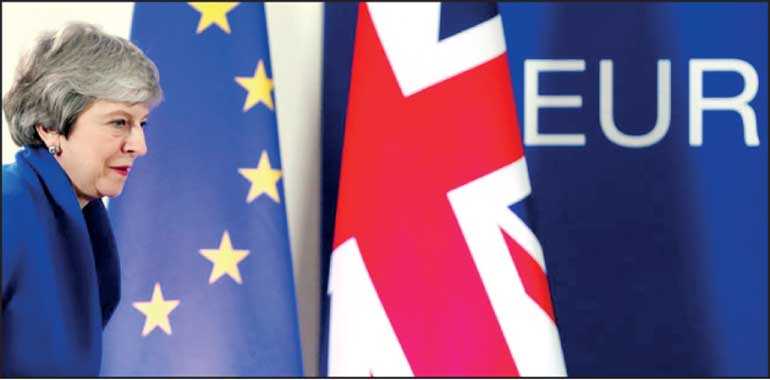Sunday Feb 22, 2026
Sunday Feb 22, 2026
Monday, 22 April 2019 00:10 - - {{hitsCtrl.values.hits}}

British Prime Minister Theresa May leaves after holding a news conference following an extraordinary European Union leaders summit to discuss Brexit, in Brussels, Belgium - REUTERS
London (Reuters): The chances that Brexit will be cancelled are now greater than the chances Britain will leave the European Union without a deal, according to economists in a Reuters poll, who again pushed back their expectations for when the Bank of England will raise interest rates.
Last week, the EU delayed Brexit until the end of October, averting for now the risk of an abrupt British departure, which investors and policymakers fear would hurt both economies.
In the latest monthly Reuters survey, taken April 12-17, the median probability Britain and the EU will part ways in a disorderly fashion - where no deal is agreed - held steady at the 15% given in March, the lowest since Reuters began asking in July 2017.
Only one of 51 respondents gave a value over 50%.
“Apart from the fact that no-deal Brexit is now less likely, the path ahead is as unclear as ever. A deal (and likely a softer Brexit) still seems more likely than not,” BNP Paribas economists said. “But we are sceptical that this will happen any time soon.”
That chimed with the views of most economists polled, who said the two sides would settle eventually on a free-trade deal - as they have in all Reuters polls since late 2016.
Britain being a member of the European Economic Area, paying into the EU budget to maintain access to the EU’s single market, was again in second place.
But the third and fourth spots flipped from last month, so leaving without an agreement and trading under World Trade Organization rules fell to least likely. Brexit being cancelled reclaimed third place, a ranking it has only held once before.
Looking at a like-for-like comparison of contributors to this and March’s poll showed the same change in views.
Hold it
None of the 75 economists polled expect Bank Rate to be moved from 0.75% when the Bank of England’s Monetary Policy Committee announces its decision next month. The MPC will publish its quarterly update of economic forecasts the same day.
“Without Brexit uncertainty, the Bank of England might have considered raising interest rates at the May 2 inflation report meeting. With the country still in limbo politically, this is highly unlikely,” said Elizabeth Martins at HSBC.
Medians suggest the first rate increase of 25 basis points will come early next year, one calendar quarter later than was forecast a month ago. Bank Rate will then stay at 1.00% throughout 2020, the poll predicted.
Britain’s economy dodged the expected post-Brexit referendum recession, but growth has slowed as uncertainty holds back investment.
UK wage growth hit a decade high in the three months to the end of February, but that was mainly driven by companies taking on workers - who can be fired relatively easily if the economy slows - rather than committing to longer-term investments.
The economy is predicted to grow a modest 0.2 to 0.4% per quarter through to the end of next year, similar to forecasts for the euro zone.
Those median forecasts for Britain were weaker than last month’s. But the chance of a recession in the coming year held steady at the 25% given in March. They fell to 25% within the next two years from 30%.
Inflation held just below the BoE’s 2% target at 1.9% last month, official figures showed on Wednesday. Thursday’s poll said it would be at or around the Bank’s target through to the end of next year.
“While a few one-off factors might see headline UK inflation rebound a touch in the short-term, the overall outlook is benign and we do not expect a rate hike from the Bank of England this year,” said James Smith at ING.